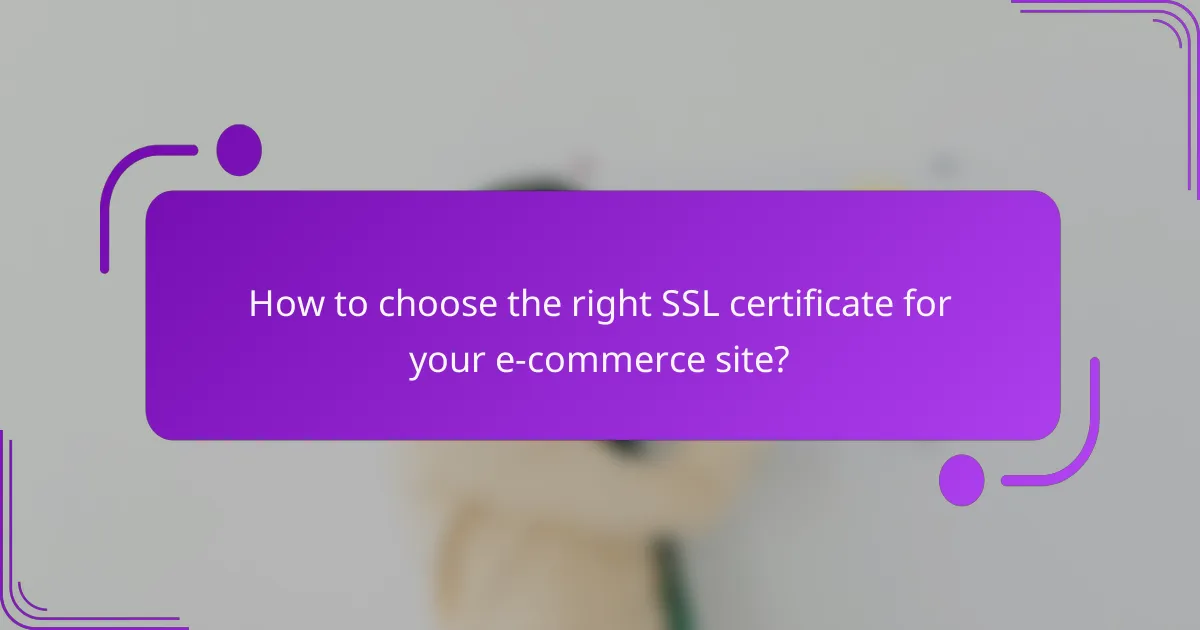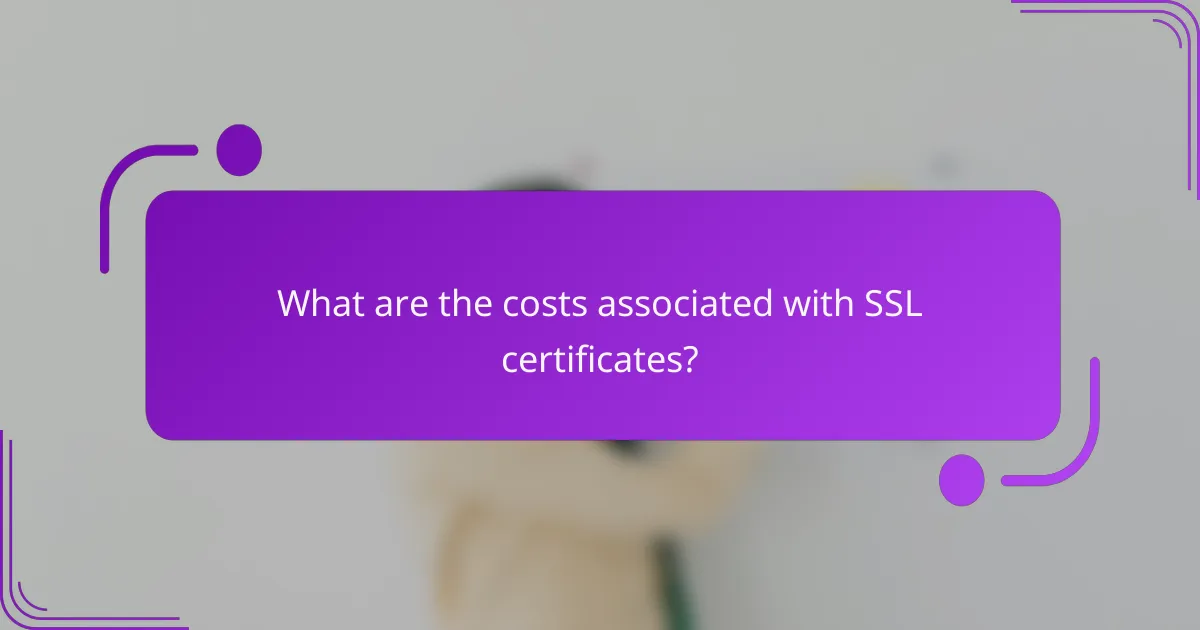Implementing SSL certificates is crucial for e-commerce security, as they encrypt data exchanged between customers and online stores, safeguarding sensitive information from cyber threats. By following a series of straightforward steps, you can ensure secure transactions and enhance customer trust in your website. Understanding the different types of SSL certificates—Domain Validated, Organization Validated, and Extended Validation—will help you choose the right level of security for your online business.

How can SSL certificates enhance e-commerce security?
SSL certificates significantly enhance e-commerce security by encrypting data exchanged between customers and online stores. This encryption protects sensitive information, such as credit card details and personal data, from potential cyber threats.
Encryption of sensitive data
SSL certificates use encryption protocols to secure data transmitted over the internet. When a customer enters their payment information, the SSL certificate encrypts this data, making it unreadable to unauthorized parties. This process ensures that sensitive information remains confidential during transmission.
Implementing SSL means that any data exchanged on your e-commerce site is encrypted, which is crucial for maintaining customer privacy. Look for certificates that offer strong encryption standards, such as 256-bit encryption, to ensure maximum security.
Building customer trust
Having an SSL certificate visibly demonstrates to customers that your e-commerce site prioritizes their security. When users see the padlock icon in their browser’s address bar, they are more likely to trust your site with their personal and payment information.
To further enhance trust, consider displaying trust seals or badges from recognized security organizations on your site. This visual reassurance can significantly increase conversion rates, as customers feel safer making purchases.
Compliance with regulations
Many regions have regulations that require e-commerce businesses to protect customer data. For instance, the General Data Protection Regulation (GDPR) in the European Union mandates strict data protection measures, including encryption. Implementing SSL certificates helps ensure compliance with such regulations.
Failure to comply with data protection laws can result in hefty fines and damage to your business’s reputation. Regularly review your security measures and stay updated on local regulations to maintain compliance and protect your customers effectively.

What are the steps to implement SSL certificates for e-commerce?
Implementing SSL certificates for e-commerce involves a series of straightforward steps that ensure secure transactions and protect customer data. By following these steps, you can enhance your website’s security and build trust with your customers.
Choose a reliable SSL provider
Selecting a trustworthy SSL provider is crucial for ensuring the security of your e-commerce site. Look for providers that offer strong encryption, excellent customer support, and a good reputation in the industry. Popular options include DigiCert, Comodo, and Let’s Encrypt.
Consider the type of SSL certificate you need, such as Domain Validated (DV), Organization Validated (OV), or Extended Validation (EV). Each type offers different levels of validation and trust, with EV certificates providing the highest assurance to customers.
Generate a Certificate Signing Request (CSR)
Ensure that the CSR includes accurate details, as any discrepancies can delay the issuance of your SSL certificate. After generating the CSR, you will typically receive a private key that must be kept secure, as it is essential for the SSL installation process.
Install the SSL certificate on your server
Once you have received your SSL certificate from the provider, the next step is to install it on your web server. The installation process may vary depending on your server type, such as Apache, Nginx, or IIS. Most SSL providers offer detailed installation guides specific to various server types.
After installation, ensure that your website is accessible via HTTPS and that there are no mixed content issues. Regularly check your SSL certificate’s expiration date and renew it before it expires to maintain uninterrupted security for your e-commerce site.

What types of SSL certificates are available for e-commerce?
For e-commerce, there are three main types of SSL certificates: Domain Validated (DV), Organization Validated (OV), and Extended Validation (EV). Each type offers different levels of validation and trust, impacting customer confidence and security.
Domain Validated (DV) certificates
Domain Validated (DV) certificates are the most basic type of SSL certificate. They verify that the applicant owns the domain but do not confirm the identity of the organization behind it. This makes them quick to obtain, often issued within minutes.
DV certificates are suitable for small websites or personal blogs where high trust is not a primary concern. However, they may not be ideal for e-commerce sites that handle sensitive customer data, as they provide minimal assurance to users.
Organization Validated (OV) certificates
Organization Validated (OV) certificates offer a higher level of security compared to DV certificates. They require the certificate authority to verify the organization’s identity, including its name and address. This process typically takes a few days to complete.
OV certificates are a good choice for small to medium-sized e-commerce businesses that want to establish credibility with customers. They provide a balance between cost and trust, making them suitable for sites that handle transactions but may not require the highest level of validation.
Extended Validation (EV) certificates
Extended Validation (EV) certificates provide the highest level of trust and security. They require extensive verification of the organization’s identity, including legal, physical, and operational existence. The process can take several days to weeks.
For e-commerce sites that prioritize customer trust, EV certificates display a green address bar or a prominent trust seal, significantly enhancing credibility. While they are more expensive than DV and OV certificates, the investment can lead to higher conversion rates by reassuring customers about their data security.

How to choose the right SSL certificate for your e-commerce site?
Choosing the right SSL certificate for your e-commerce site is crucial for ensuring secure transactions and building customer trust. Consider factors such as your business size, the level of validation needed, and your budget to make an informed decision.
Assess your business size and needs
Your business size significantly influences the type of SSL certificate you should choose. Small businesses may opt for a Domain Validated (DV) certificate, which is cost-effective and quick to obtain, while larger enterprises often require Organization Validated (OV) or Extended Validation (EV) certificates for enhanced security and credibility.
Evaluate the volume of transactions and customer data you handle. If your site processes sensitive information, investing in a higher-level certificate can provide better protection and peace of mind for your customers.
Consider the level of validation required
SSL certificates come with different levels of validation: DV, OV, and EV. DV certificates verify domain ownership, making them suitable for smaller sites, while OV certificates provide additional verification of the organization, which is beneficial for businesses that want to enhance trust.
EV certificates offer the highest level of validation, displaying the organization’s name in the browser’s address bar. This is ideal for e-commerce sites that prioritize customer trust and security, especially in competitive markets.
Evaluate budget and pricing options
SSL certificate pricing can vary widely based on the type and level of validation. DV certificates are typically the most affordable, often costing between $10 and $100 per year, while OV and EV certificates can range from $50 to several hundred dollars annually.
Consider your budget alongside the potential return on investment. A higher-priced certificate may lead to increased customer confidence and higher conversion rates, making it a worthwhile expense for your e-commerce site.

What are the costs associated with SSL certificates?
The costs associated with SSL certificates can vary significantly based on the type of certificate, the provider, and additional services. Generally, businesses should consider annual subscription fees, installation and maintenance costs, and potential penalties for non-compliance when budgeting for SSL implementation.
Annual subscription fees
Annual subscription fees for SSL certificates typically range from around $10 to several hundred dollars, depending on the certificate type and the issuing authority. Standard Domain Validation (DV) certificates are usually the most affordable, while Extended Validation (EV) certificates, which provide a higher level of trust, can be more expensive.
When selecting a certificate, consider the reputation of the Certificate Authority (CA) and the level of validation required for your e-commerce site. Some providers may offer discounts for multi-year purchases, which can help reduce long-term costs.
Installation and maintenance costs
Installation and maintenance costs can vary based on your technical expertise and the complexity of your website. If you have in-house IT support, they may handle installation at no additional cost. However, if you need to hire external help, installation fees can range from $50 to several hundred dollars.
Regular maintenance, including certificate renewals and updates, should also be factored into your budget. Ensure that your SSL certificate is renewed before expiration to avoid any disruptions in service.
Potential penalties for non-compliance
Failure to implement SSL certificates can lead to significant penalties, including loss of customer trust and potential legal repercussions. For e-commerce sites, not securing customer data can result in fines under regulations such as the General Data Protection Regulation (GDPR) in Europe.
Additionally, browsers may flag non-secure sites, leading to decreased traffic and sales. Investing in SSL not only protects your business but also helps maintain compliance with industry standards and regulations.

What are common challenges in implementing SSL certificates?
Implementing SSL certificates can present several challenges, including technical complexities, costs, and ongoing management. Organizations must navigate issues such as certificate compatibility, renewal processes, and ensuring proper configuration to maintain security and trust.
Technical complexities
One of the main technical challenges in implementing SSL certificates is ensuring compatibility with existing systems and software. Different web servers and applications may require specific configurations, which can lead to errors if not handled correctly. Additionally, organizations must be aware of the various types of SSL certificates available, such as single-domain, multi-domain, and wildcard certificates, each serving different needs.
Costs and budget considerations
The costs associated with SSL certificates can vary significantly based on the type and provider. Basic certificates may start at a few dollars annually, while more advanced options can reach hundreds or even thousands of dollars. Organizations should weigh the benefits of higher-tier certificates, which often include additional features like extended validation and warranty, against their budget constraints.
Ongoing management and renewal
SSL certificates require regular management, including monitoring expiration dates and renewing them on time to avoid service interruptions. Many organizations overlook the importance of tracking these dates, leading to potential security risks. Implementing automated reminders or using certificate management tools can help streamline this process and ensure continuous protection.
